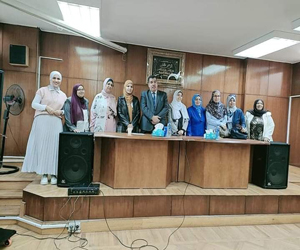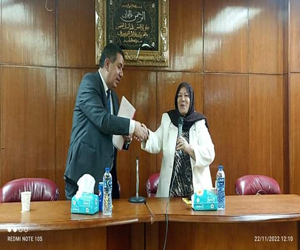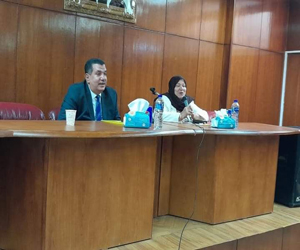Adult education is an introduction to achieving a green economy to meet the requirements of sustainable development in light of climate change... A symposium at the Faculty of Girls
Under the auspices of Prof. Dr. Mahmoud El-Meteini, President of the University, and Prof. Dr. Ghada Farouk, Acting Vice President for Community Service and Environmental Development, the Community Service and Environmental Development Sector, in cooperation with the Department of Fundamentals of Education, organized a symposium entitled "Adult Education: An Introduction to Achieving a Green Economy to Meet the Requirements of Sustainable Development in Light of Changes" climate, sponsored by Prof. Dr. Amira Youssef, Dean of the Faculty and Prof. Dr. Heba Adel, Vice Dean for Community Service and Environmental Development.
The seminar was presented by Prof. Dr. Osama Farrag, Head of the Department of Higher and Continuing Education, Faculty of Graduate Studies of Education, Cairo University. During the symposium, he presented several important axes, including the relationship between adult education and climate change.
He pointed out that climate change is a global phenomenon, but its impact varies from one place to another, so all international and local efforts must come together to reach non-traditional alternatives to solve the problems of climate change.
He also noted the role of adult education in spreading awareness of the importance of preserving the environment through its various fields.
 |
 |
 |
||
He presented the beginning of the emergence of the green economy and the factors that prompted countries to resort to it, and explained that the green economy means reshaping and correcting economic activities, and touched on the role of the green economy in achieving the requirements of sustainable development.
He explained the difference between sustainable development and permanent development. Sustainable development is the best term because development is human-made. Development does not occur on its own. But permanent development depends on material resources that may perish or disappear.
His Excellency also mentioned that adult education has become a gateway to achieving a green economy by adopting the philosophy of lifelong learning.
In the end, he explained that education is the basis for preparing qualified and trained manpower and that the widespread cases of poverty in the world are not due to a lack of money only, but rather refer to a lack of civilized and cultural awareness.


.svg)




